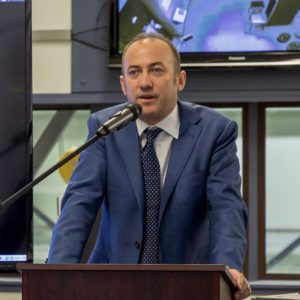 Dr Cormac Corr is a lecturer in physics and leads an internationally recognised research group at the Australian National University (ANU). He was appointed Director of the $30 million Australian Plasma Fusion Research Facility in 2016. Cormac grew up in Tralee, Co. Kerry. He obtained an Honours degree in Applied Physics and a PhD in plasma physics from Queens University Belfast. From 2003 to 2006 Cormac spent three years working at Ecole Polytechnique in Paris and commenced work at ANU in 2006.
Dr Cormac Corr is a lecturer in physics and leads an internationally recognised research group at the Australian National University (ANU). He was appointed Director of the $30 million Australian Plasma Fusion Research Facility in 2016. Cormac grew up in Tralee, Co. Kerry. He obtained an Honours degree in Applied Physics and a PhD in plasma physics from Queens University Belfast. From 2003 to 2006 Cormac spent three years working at Ecole Polytechnique in Paris and commenced work at ANU in 2006.
In 2010 Cormac was awarded a prestigious Australian Research Council Future Fellowship. He established a new research initiative and group at the ANU that focuses on plasmas and their interactions with surfaces. Plasma being an ionised gas, comprises a complex environment that includes charged particles, neutral gas molecules, ultra-violet radiation, electric fields and reactive species. Cormac’s group creates plasma in different forms to exploit their unique properties for many applications, from surface modification for the agriculture and semiconductor sectors to clean energy production by nuclear fusion. Cormac is a passionate educator, finding that teaching challenges his work vision and urges him to improve his practices. His motivation as a teacher is to inspire students to reach their full potential and to gain the skills, knowledge and confidence to advance within their chosen career pathway, and also in life in general. Cormac takes pride in mentoring both undergraduate and graduate students, with an aim of increasing the retention and capacity in STEM subjects.
Can leadership be taught? If so, how?
Some aspects of leadership can certainly be taught, however, coached may be the more appropriate term. There are a number of qualities essential to be able to leverage strengths and understand weaknesses, such as self-awareness, emotional intelligence and a willingness to advance. There are many different ways to lead, so coaching would involve leveraging a person’s strengths, providing the opportunity for ongoing self-reflection and developing a range of tools to assist in combatting more difficult leadership situations.
What do you think is the difference between management and leadership?
There are some important distinctions between leading and managing. A leader will have a vision and then inspire, motivate and engage people to make that vision a reality. A manager will have a goal and will set about trying to achieve that goal by managing situations and people. Leaders tend to be self-aware and are comfortable with standing out from the crowd, building their own unique style. Managers will learn from others and adopt leadership practices rather than defining it. A leader will have people follow then whereas a manager will have people who work for them.
The world around us is changing faster than at any time in human history and we need more leaders to emerge. How do we make this happen?
The key to developing more leaders is to create environments where people feel empowered, supported and trusted so that people can engage positively with risk. For example, if an organisation is micromanaged by a leader, or constrained by historic processes, it will be difficult for people to further innovation and new ideas. It is also vital that subject matter expertise is boosted by more well-rounded skill sets, for example, presentation or relationship building skills. This will ensure that a person can be deep in one area of expertise, but knows how to build their vision, influence and make connections for significantly better outcomes.
What is the one mistake you witness leaders making more frequently than others?
Not delegating. I often observe leaders trying to do it all, focusing on getting a task resolved quickly rather than using the journey. This means they are not focused on mentoring and coaching their employees, which can degrade trust and deny employees the opportunity for new challenges.
What advice would you give to someone dealing with a high-pressure situation in their life or work?
That difficult or challenging situations are the ones that define and strengthen you as a person and a leader. They should be embraced, not avoided, especially in the workplace. It is these situations that will set you apart in job interviews, as well as a future leader and coach.
What are a few resources (books, blogs, podcasts, courses etc) you would recommend to someone looking to gain insight into becoming a better leader?
Different perspectives on leadership will resonate differently to people, so my advice is to challenge yourself to read concepts which may sound ‘out there’ as they may be the thing that strikes a chord (for example Hardwired Humans leadership concept is based on understanding biological and anthropological human instincts).
